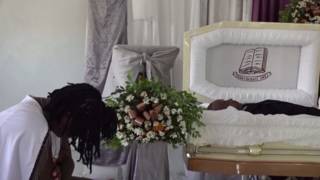
Topics
Guests
- Lt. John Oliveira (Ret.)Served as public affairs officer for the USS Theodore Roosevelt and was deployed in Iraq and Afghanistan. In September of 2001 he was part of the first battle group to deploy following the attacks of Sept 11th. He spent six and a half months overseas mostly in the northern Indian Ocean managing the public relations effort of a 102 ship international force during the U.S attack on Afghanistan. Last year he was stationed near Iraq.
We speak with an attorney with the National Lawyers Guild which recently sent a delegation to Haiti. He says he saw hundreds of corpses being dumped by morgues in Haiti and describes bodies coming in with plastic bags over their heads and hands tied behind their backs, piles of corpses burning in fields and pigs eating their flesh.
It has been a little over a month since Haitian President Jean-Bertrand Aristide was ousted and a new U.S.-backed government was installed in what Aristide has called a “modern-day kidnapping in service of a coup.”
U.S. troops were ordered to Haiti within one hour of President Aristide’s departure even though both President Bush and Secretary of State Colin Powell had said they would not deploy more forces there until there was a political solution. Despite the 3,500 U.S.-led troops in the country, the battle for control is still being waged in numerous Haitian towns.
The Jamaica Observer is reporting that gang leaders and paramilitaries still control large swaths of northern Haiti, sometimes jailing suspected criminals, sometimes persecuting Aristide supporters. They patrol the streets, dispensing their own brand of justice, arresting and jailing alleged criminals while hoping to eventually become paid police officers or soldiers in a new Haitian army.
Louis Jodel Chamblain, convicted in absentia for the 1994 Raboteau massacre, spends much of his time in Cap Haitien. Most of his men, 20 to 35 years old, have a new long-term objective: to serve in a new version of the Haitian army. Aristide abolished the army in 1995 as a coup-prone machine responsible for human rights violations.
The National Lawyers Guild and several organizations denounced the U.S. government for its role in the forced removal of President Aristide. They demanded a Congressional investigation into the role of the U.S. government in the deliberate destabilization of the Haitian government and the implementation of the coup; an immediate end to the repression and daily attacks on those demanding the return of President Aristide; and support for Haitian refugees.
The National Lawyers Guild recently sent a delegation to Haiti to meet with victims and their families, witnesses and grassroots leaders. Attorney Tom Griffin was part of that delegation. He joins us on the phone from Philadelphia.
- Tom Griffin, part of a delegation sent by the National Lawyers Guild to Haiti to meet with victims and their families, witnesses and grassroots leaders.












Media Options